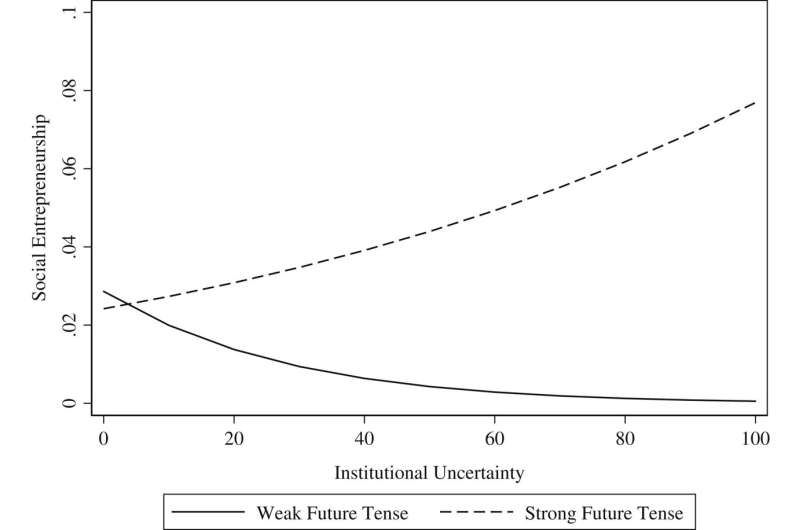Future time reference × institutional uncertainty on social entrepreneurship. Credit: Strategic Entrepreneurship Journal (2022). DOI: 10.1002/sej.1450
The rise in social entrepreneurship over the last 20 years denotes a major global economic and political movement. Social entrepreneurs generate substantial positive outcomes, but while they make up 2% or more of GDP in countries like Canada, Australia and the UK, many other societies have a shortage of them. A recent study from a special issue of the Strategic Entrepreneurship Journal (SEJ) suggests the reason why might depend on language.
"Individuals speaking languages with strong future time references see future rewards and challenges as more distant," said Diana M. HechavarrÍa, and associate professor of management at Texas Tech University and one of the study's authors. "That mindset fosters social entrepreneurship because it places a strong value on obtaining immediate results for social issues while discounting long-term costs."
HechavarrÍa partnered with Steven A. Brieger (University of Sussex), Ludvig Levasseur (Indian Institute of Bangalore), Siri A. Terjesen (Florida Atlantic University), all experts in entrepreneurship and international business, to study the effects of language and institutional uncertainty on social entrepreneurship. Using a sample of 205,792 individuals in 70 countries with 39 languages, they controlled for 13 individual- and country-level characteristics related to social entrepreneurship including gender, age, education, income and start-up skills.
The researchers used multilevel logistic modeling to estimate each dependent variable within and between countries and found that the odds of engaging in early-stage innovative social entrepreneurship almost doubled in futured-language speaking societies (i.e. languages that modify verbs to indicate the future instead of relying on context). The probability that an individual is a social entrepreneur also increased when there was weak rule of law, weak property rights and strong corruption within a future-speaking country.
"Countries where a state arbitrarily applies laws and rules, suppresses individual rights or threatens certain social groups by confiscating their property tend to have greater social problems, and there are just more opportunities for individuals to enhance societal well-being," said Brieger.
The SEJ study notes that these factors have differing effects on commercial entrepreneurs, who favor more long-term oriented mindsets and more predictable business and social environments with strong institutions.
"Strong future time reference speakers see longstanding social problems as urgent dilemmas rather than long-term goals," said Terjesen. "They perceive the future as uncertain and may feel more urgency when it comes to engaging in social entrepreneurship to address those dilemmas."
Though the results seem logical, experts across the field have long debated what specifically drives a social entrepreneurial mindset. Before the onset of their research, the authors had hypothesized that societies with strong social institutions might place a higher value on social value creation, resulting in more social entrepreneurship. They also noted that the idea that language has an impact on shaping thought has faced unpresented vacillation in acceptance.
"The study provides evidence that an individual's subjective conception of time has an important impact on their social entrepreneurial action," said Levasseur. "Moreover, a language's grammatical representation of time affects their conception of it."
While the social entrepreneurship field certainly merits more research, this particular study suggests that perceptions of time—and specifically the idea of urgency—play a high motivating factor for social entrepreneurship. It also suggests that language has been overlooked as a means of understanding strategic entrepreneurial behaviors.
More information: Diana M. Hechavarría et al, Cross‐cultural implications of linguistic future time reference and institutional uncertainty on social entrepreneurship, Strategic Entrepreneurship Journal (2022). DOI: 10.1002/sej.1450
Provided by Strategic Management Society






















